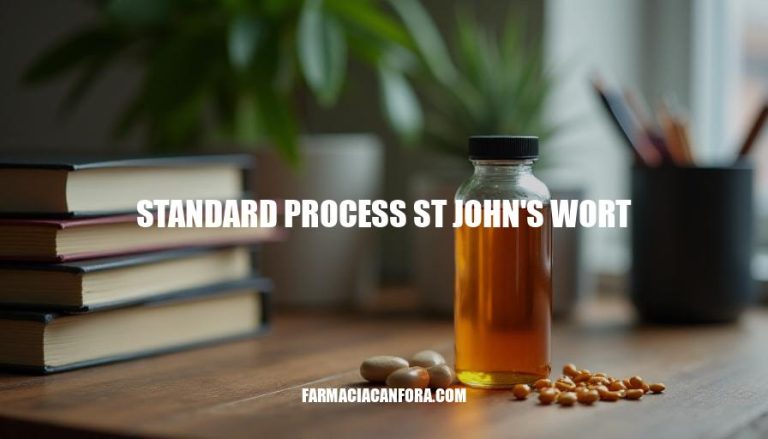


St John’s Wort is a plant that’s been used for centuries in herbal medicine. It has bright yellow flowers and grows in many parts of the world. To use it as medicine, people harvest its flowers and leaves when they’re in bloom, dry them out, and then turn them into different forms like capsules or tinctures.
St. John’s Wort (Hypericum perforatum) is renowned for its potential benefits in mental health and mood regulation. This herb has been used for centuries in traditional medicine and continues to be a popular choice in modern herbal practices.
Effects on Mental Health and Mood Regulation:
Antidepressant Properties: St. John’s Wort is widely recognized for its ability to alleviate symptoms of mild to moderate depression. The active compounds, hypericin and hyperforin, are believed to influence neurotransmitter systems, particularly serotonin, dopamine, and norepinephrine, which play crucial roles in mood regulation.
Anxiety Relief: This herb has shown promise in reducing anxiety symptoms.
By modulating neurotransmitter activity, St. John’s Wort may help promote a sense of calm and reduce feelings of anxiety.
Seasonal Affective Disorder (SAD): St. John’s Wort is sometimes used to manage symptoms of SAD, a type of depression that occurs at certain times of the year, usually in the winter. Its mood-enhancing effects can help alleviate the low mood associated with this condition.
Sleep Disorders: The herb’s calming properties may also aid in improving sleep quality, making it beneficial for individuals with sleep disturbances related to anxiety or depression.
Applications in Modern Herbal Practices:
Mood Support: St. John’s Wort is commonly used as a natural alternative to pharmaceutical antidepressants, especially for those seeking a holistic approach to mental health. It is available in various forms, including capsules, tablets, tinctures, and teas.
Nerve Pain Relief: In addition to its mental health benefits, St. John’s Wort is used to alleviate nerve pain, such as sciatica or neuralgia.
Its anti-inflammatory and analgesic properties make it a valuable herb for managing nerve-related discomfort.
Wound Healing: Applied topically, St. John’s Wort can aid in the healing of burns, bruises, and minor wounds due to its anti-inflammatory and astringent properties.
Holistic Health: In African traditional medicine, St. John’s Wort is used not only for its mental health benefits but also for its ability to restore harmony within one’s spirit and protect against negative energies. This holistic approach emphasizes the balance between physical, emotional, and spiritual health.
St. John’s Wort continues to be a versatile and valuable herb in both traditional and modern herbal practices, offering a range of benefits for mental health and overall well-being.
:
:
:
:
1www.verywellmind.com2vitalibrary.com3www.mentalhealth.com4guimeds.com
St John’s Wort is a plant used for centuries in herbal medicine, with bright yellow flowers that grow worldwide. To use it as medicine, people harvest its flowers and leaves when in bloom, dry them out, and turn them into different forms like capsules or tinctures.
The herb has been recognized for its potential benefits in mental health and mood regulation, including alleviating symptoms of mild to moderate depression, reducing anxiety symptoms, managing Seasonal Affective Disorder (SAD), and improving sleep quality. Its active compounds, hypericin and hyperforin, influence neurotransmitter systems, particularly serotonin, dopamine, and norepinephrine.
St John’s Wort is used in various forms, including capsules, tablets, tinctures, and teas, as a natural alternative to pharmaceutical antidepressants. It is also used to alleviate nerve pain, such as sciatica or neuralgia, due to its anti-inflammatory and analgesic properties. Topically applied, it can aid in wound healing.
The herb continues to be a versatile and valuable plant in both traditional and modern herbal practices, offering benefits for mental health and overall well-being. Its holistic approach emphasizes balance between physical, emotional, and spiritual health. Future studies may explore its potential applications and mechanisms of action further, particularly in the context of African traditional medicine, where it is used to restore harmony within one’s spirit and protect against negative energies.